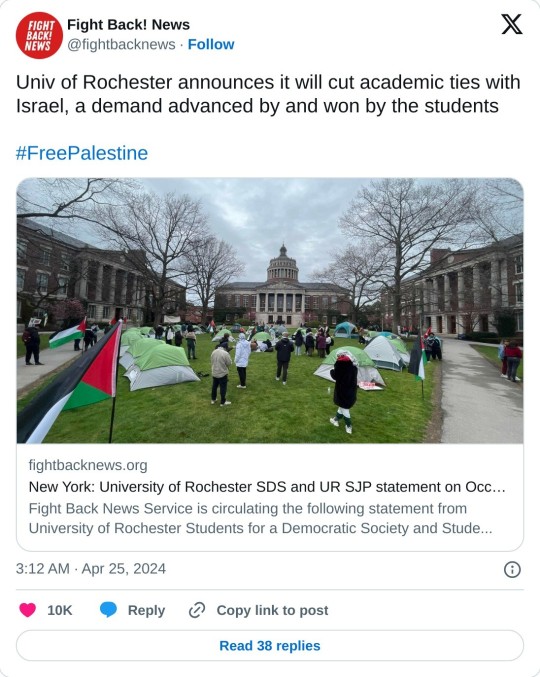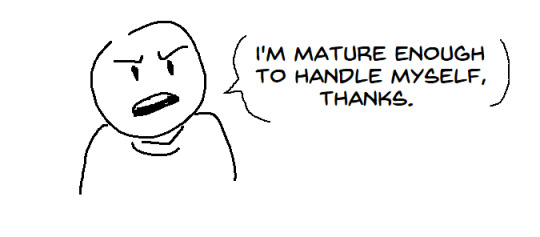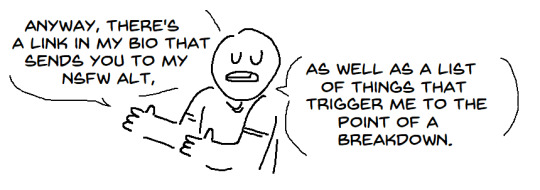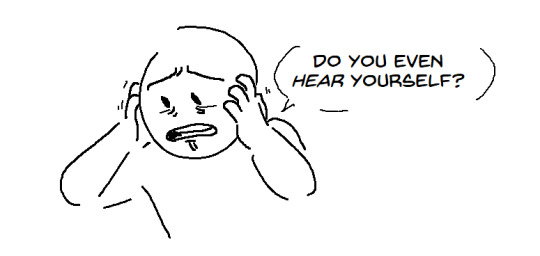Text
in light of police across the country cracking down on pro palestine protests with brutal force, it feels like a great time to remind everyone to shut the fuck up around cops. don't make small talk, dont act friendly, don't fucking engage with them!! if you are arrested DO NOT speak without a lawyer present. protest organizers, get into contact with local pro bono lawyers who can be there for your arrested comrades. no matter what, if cops are there, shut the fuck up unless you are actively doing a protest chant. dont tell cops why you were there, dont tell them if you're affiliated with the school you may be protesting at, dont tell them if you came there with anyone, dont tell them anything!!!
12K notes
·
View notes
Text
So, there's a lot of USians around who are very clearly fucking fed up with their political choices this election cycle, and planning to sit it out.
And I get it! What's the point of voting if there's no one to vote for?
The thing is, I'm Australian. In Australia, voting is compulsory. We don't get to sit out our elections, and I'll be real honest with you - we don't exactly get better choices than you lot. So how do you vote if there's no one to vote for? You find someone to vote against. And there's always someone to vote against.
Now, we have the pleasure of preferential voting in Australia - We get to rank every candidate from 1 to X, and I'll tell you, there's something so cathartic about putting the biggest bastard of the lot at the very bottom of your preferences. I understand that USians don't get that option - you get to mark one person, and that's it.
That means that you get one shot, so aim it at the biggest bastard of the lot. The candidate you most utterly detest. Put your vote in the worst possible place for them. Don't even think about who that vote's going towards, that's not the point. Remember, every vote is a vote against someone. Make sure you fuck up that someone's election day!
6K notes
·
View notes
Text
i haven't mentioned in a while that i love wang zhuocheng so here, this man just made me crylaugh at 5:30am (x)
169 notes
·
View notes
Text
“I first started noticing the journalists dying on Instagram. I'm a journalist, I'm Arab, and I've reported on war. A big part of my community is other Arab journalists who do the same thing.
And when someone dies, news travels fast. Recently, I pulled up the list that the Committee to Protect Journalists has been keeping and looked at it for the first time. There are 95 journalists and media workers on it as of today.
Almost everyone on it is Palestinian. Scrolling through, I started to get angry. These were the people carrying the burden of documenting this whole war.
Israel is not allowing foreign journalists into Gaza, except on rare occasions with military escorts. These people's names are being buried in a giant list that keeps growing. What I want to do is lift some of them off the list for a moment and give you a glimpse of who they were and the work they made.
I'll start with Sadi Mansour. Sadi was the director of Al-Quds News Network, and he posted a 22-second video on November 18. That was a report from the war, but it also gave me a picture into his marriage.
Sadi's wearing his press vest and looks exhausted. He's explaining that cell service and the Internet keep getting cut off, and it's often impossible to text or call anyone, including his wife. So they've resorted to using handwritten letters to communicate while he's out reporting, sending them back and forth with neighbors or colleagues.
He ends the video with a picture of one of these letters from his wife. In it, she writes,
‘Me and the kids stayed up waiting for you until the morning, and you didn't come home. We were really sad.
I kept telling the kids, Look, he's coming. But you didn't show up. May God forgive you.
Come home tomorrow and eat with us. Do you want me to make you kebab or maybe kapse? Bring your friends with you, it's okay.
And give Azeez the battery to charge. What do you think about me sending you handwritten letters with messenger pigeons from now on? Ha ha ha.
I'm just kidding. I want to curse at you, but we're living in a war. Too bad.
Okay, I love you. Bye.’
A few hours after he shared that letter, Sadie and his co-worker Hassouna Saleem were at Sadie's home, when they were killed by an Israeli air strike that hit his house.
His wife and kids, who weren't there, survived.
Gaza is tiny, and the journalist community is really close. Reading the list, you can see all the connections between people. Like with Brahim Lafi.
Brahim was a photojournalist, one of the first journalists to die. He was killed while reporting on October 7. He was just 21, still new to journalism.
On his Instagram, you can see that in his posts just a few years ago, he was still practicing his photography, taking pictures of coffee cups and flowers. Then he started doing beautiful portraits and action shots. You can really feel him starting to become a journalist.
Clicking around on Instagram, I found a tribute post about Brahim from his co-worker Rushdie Sarraj. In this photo, Brahim staring intently at the back of a camera, his face lit up by the light from the viewfinder. He looks so young.
The caption reads, My assistant is gone. Brahim is gone. Rushdie himself was a beloved journalist and filmmaker.
And I know that because he's also on the list. He was killed just two weeks after Brahim. I read the tribute post to him too.
I saw this over and over again. Journalists posting tributes, who were then killed themselves soon after. And a tribute goes up for them.
And then the pattern continues.
Thank you.
Something else I saw over and over on the list, journalists later in the war who had become aware that they could be making their last reports. They'd say it at the beginning of their videos. And those were the hardest to watch, especially when it was true.
One video like that was posted by Ayat Hadduro. Ayat was a freelance journalist and video blogger. Her videos before the war covered a wide range from what I can tell, interviews about women in politics.
She even appeared in a commercial for ketchup-flavored chips. She clearly liked being in front of the camera. Once the war started, Ayat's pivoted to covering bombings and food shortages.
On November 20, she posted a video report from her home. You can hear the airstrikes hitting very close to where she is. It's scary.
‘This is likely my last video. Today, the occupation forces dropped phosphorus bombs on Beit Lahya area and frightening sound bombs. They dropped letters from the sky, ordering everyone to evacuate.
Everyone ran into the streets in the craziest way. No one knows where to go.
But everyone else has evacuated. They don't know where they're going. The situation is so scary.
What's happening is so tough, and may God have mercy on us.’
She was killed later that day.
Targeting journalists, in case you didn't know, is a war crime. So far, the Committee to Protect Journalists has found that three of the journalists on the list were explicitly targeted by the IDF, the Israeli military. Investigations by the Washington Post and Reuters, Human Rights Watch and the United Nations have also raised serious questions in these three cases.
And the Committee to Protect Journalists is investigating 10 other killings. When we reached out to the IDF for comments, they said, quote, the IDF has never, and will never, deliberately target journalists. That's the answer they always give in these situations.
Meanwhile, dozens of seasoned reporters have fled Gaza. Journalists who worked for Al Jazeera, the BBC, the New York Times, the Washington Post, Reuters, Agence France-Presse. So many media offices were demolished in Israeli airstrikes that the Committee to Protect Journalists stopped counting.
It's not just individual lives that have been destroyed. It's an entire infrastructure.
Thank you.
The name on the list that was hardest for me to look at was Issam Abdullah, because I'd crossed paths with him once. Issam was a Lebanese journalist, a video journalist for Reuters for many, many years. He had just won an award for coverage of Ukraine.
I'm Lebanese and still report there sometimes, and I'd worked with Issam a couple of summers ago. He helped me film a sort of random story in Beirut. I was interviewing this entrepreneur who had started a sperm freezing company after an accident where he spilled a tray of hot coffee on his private area, burning himself.
I know, ridiculous. It was a really silly shoot. Right after we said cut and started to rap, Issam started this whole bit about being in his late 30s, reconsidering his own sperm quality and everything he now realized he was doing to hurt it, and no one could stop laughing.
It was a really good day that felt good to remember and to remember him that way. Issam was killed by the IDF on October 13. His death was one of the three that the Committee to Protect Journalists has identified as a targeted killing.
He was fired upon by an Israeli tank while standing in an empty field on the Lebanon-Israel border with a small group of other journalists. Everyone was wearing press vests with cameras out. They were covering the Hezbollah part of this war.
A few other journalists were injured in the attack, which was captured on video. The IDF says they were responding to firing from Hezbollah, not targeting the journalists. But multiple investigations, including by Reuters, the United Nations, Amnesty International and the AFP, found no evidence of any firing from the location of the journalists before the IDF shot at them.
The journalists in the group and video footage confirmed that there was no military activity near them. I had only met Issam once, barely knew him, but it affected me so much when he died. I know that he understood the risks of his job, but somehow it still felt so random and unfair that he would be struck down like that, following the rules, wearing his press vest and helmet, and a pack of reporters on a sunny day in an open field.
I find myself thinking about him all the time. His last Instagram post was commemorating another journalist, this iconic reporter Shereen Abou Aql who had been killed by the IDF. When I first saw that post in October, I thought how ironic because a week later, Isam also was killed by the IDF.
But then, after spending time reading the list, I realized how common this had become. I still haven't finished going through the list and looking up the people on it. I keep finding things that stick with me, like the funny way this one radio host would cut off a caller who was rambling on for too long.
A tweet from reporter Al-Abdallah that quoted Sylvia Plath. It read, What ceremony of wars can patch the havoc? I'm going to keep going down the list, even though this story is over now.
Just for myself. My own way of bearing witness. Which is, in the end, all that these journalists were trying to do.”
—DANA BALLOUT, The 95. Dana sifts through a very long list—the list of journalists killed in the Israel-Hamas war, and comes back with five small fragments of the lives of the people on it. Dana is a Lebanese-American, Emmy-nominated documentary producer.
2K notes
·
View notes
Text
daily reminder that boycotting is not a moral stance but a political strategy, so the whole “there’s no ethical consumption under capitalism” argument is not the gotcha you think it is
you can refer to BDS if you’d like a list of companies to focus your efforts on. you can refer to this website if you’d like to become more conscientious about what you’re buying and check for brands/products to avoid.
*please note that i am a palestinian who has been boycotting my entire life. do not try to explain to me in the tags or reblogs or replies what a targeted boycott is or complain about giving up your comfort for something that you (incorrectly) believe does not make an impact. being quiet is free. exercise your right to remain silent today.
11K notes
·
View notes
Text
Ask an older generation of white South Africans when they first felt the bite of anti-apartheid sanctions, and some point to the moment in 1968 when their prime minister, BJ Vorster, banned a tour by the England cricket team because it included a mixed-race player, Basil D’Oliveira.
After that, South Africa was excluded from international cricket until Nelson Mandela walked free from prison 22 years later. The D’Oliveira affair, as it became known, proved a watershed in drumming up popular support for the sporting boycott that eventually saw the country excluded from most international competition including rugby, the great passion of the white Afrikaners who were the base of the ruling Nationalist party and who bitterly resented being cast out.
For others, the moment of reckoning came years later, in 1985 when foreign banks called in South Africa’s loans. It was a clear sign that the country’s economy was going to pay an ever higher price for apartheid.
Neither of those events was decisive in bringing down South Africa’s regime. Far more credit lies with the black schoolchildren who took to the streets of Soweto in 1976 and kicked off years of unrest and civil disobedience that made the country increasingly ungovernable until changing global politics, and the collapse of communism, played its part.
But the rise of the popular anti-apartheid boycott over nearly 30 years made its mark on South Africans who were increasingly confronted by a repudiation of their system. Ordinary Europeans pressured supermarkets to stop selling South African products. British students forced Barclays Bank to pull out of the apartheid state. The refusal of a Dublin shop worker to ring up a Cape grapefruit led to a strike and then a total ban on South African imports by the Irish government.
By the mid-1980s, one in four Britons said they were boycotting South African goods – a testament to the reach of the anti-apartheid campaign. . . . The musicians union blocked South African artists from playing on the BBC, and the cultural boycott saw most performers refusing to play in the apartheid state, although some, including Elton John and Queen, infamously put on concerts at Sun City in the Bophuthatswana homeland.
The US didn’t have the same sporting or cultural ties, and imported far fewer South African products, but the mobilisation against apartheid in universities, churches and through local coalitions in the 1980s was instrumental in forcing the hand of American politicians and big business in favour of financial sanctions and divestment.
By the time President FW de Klerk was ready to release Mandela and negotiate an end to apartheid, a big selling point for part of the white population was an end to boycotts and isolation.
Twenty-seven years after the end of white rule, some see the boycott campaign against South Africa as a guide to mobilising popular support against what is increasingly condemned as Israel’s own brand of apartheid.
. . . continues at the guardian (21 May, 2021)
3K notes
·
View notes
Text
the fact that eric kripke isn't even christian really adds something to the way christianity is depicted on supernatural. because its really not about being christian at all, but about living in america, a country dominated by christianity, and having to decide for yourself how to handle that. faith is huge in supernatural, and the mythology of the show is very bible-centric, but notably, christ is never there. even sam, who starts out revering the angels, who once said he prays every night, doesn't actually call himself a christian or imply that he believes in jesus--the show is steeped in christianity and biblical lore and yet neither sam nor dean are christians. in fact, over and over again the church itself is depicted as a haunted house that sam and dean will only ever enter as strangers, as outsiders. priests, preachers, faith healers, chapels, crypts, etc. are all just iconography that create an intense sense of unease that sam and dean respond to instantly. as a jew, its very relatable. an essential part of living in america when you're not christian is that exact sense of unease, of knowing that the culture of your country has ensured that you'll get knocked over by christianity no matter where you go, that you'll see hundreds of people truly believing they're good people while doing awful things in the name of their god, and you have no choice but to confront that. kripke gets it
8K notes
·
View notes
Note
how does one cope when mid-way through they realize they are writing a tragedy and there is no possibility of a happy ending? especially when that was not the original intention? i'm absolutely gutted by this realization and i hate that i feel wedded to it.
Upset Because Story Went Off the Rails
You're a Writer, Not a Marionette - Long ago, I bought into the believe that characters and stories have minds of their own... that it was beyond my control if my character did X when I wanted them to do Y... that there was nothing I could do if my happy meet-cute story decided to be a dark tale of horror. It can be kind of fun (and freeing, honestly) to believe we're just helpless vessels through which some greater storytelling force speaks, but that's not the case at all. There's no magical entity pulling the strings beyond your control. If your character does X and you wanted them to do Y, you did that, not your character. If your happy meet-cute turns into a tragic horror, you did that, not your story. You're the writer, and you're in control of everything that does or does not happen in your story.
Does It Make the Story Better? - Human brains are incredible things, and sometimes when your character does X when you intended for them to do Y, it's because some part of your brain realizes that's the better choice. Maybe it's more believable or more natural. Maybe it just works better with what you're laying out. Maybe it's just more interesting. So, the trick is to look at the unintended thing that happened and ask yourself if it makes the story better. Make a list of pros and cons... what are the ways the story is better if you stick with X rather than Y. What are the ways it's worse? Ultimately, if the change truly makes the story better, it's worth following through.
Beware of Story Parasites - Parasites are organisms that invade and thrive inside a host organism, at the host organism's expense. When you're writing your WIP and it takes a massive shift in tone, genre, or direction, sometimes that's because a whole new story idea has bullied its way into this one and is now feeding off this story to survive. If the unintended thing doesn't make the story better and leaves you feeling upset about the direction things are heading, you've probably got a story parasite. In which case, the best thing you can do is write the idea down as generally as possible, and set it aside to work on another time. Treating this invasive idea as something distinct from your WIP can help you move on and keep your story on its intended path.
What To Do When the Change Has to Stay - Very rarely, you may find that story's original direction just isn't working, and that this new (and vastly different) direction makes for a much better story. In that case--if you're absolutely certain this is the right path--it's worth making a list of all the reasons this idea will be better. Try to imagine what the story will be like if you stick with the original plan, versus if you make the drastic change. Can you think of anything that excites you about this new idea? Can you find reassurance in the many ways that this story shines versus the original idea?
Ultimately, It's Up to You - If your story takes an unexpected and upsetting turn, and you're certain it's the superior course, and that there's no point in pursuing the story's original path instead, it's worth really taking a look at why it's so upsetting if it's the right thing to do. If you're disappointed that your original plan didn't work out, spend some time trying to figure out how to make the original plan work better than the new idea. If you're upset because this idea is too personal or triggering, set it aside and see if you can come back to it later. You're not obligated to keep working on a story if it shifts in a direction that makes you unhappy or uncomfortable. You can set it aside or figure out a way to keep it in your comfort zone.
I hope that helps!
•••••••••••••••••••••••••••••••••
I’ve been writing seriously for over 30 years and love to share what I’ve learned. Have a writing question? My inbox is always open!
LEARN MORE about WQA
SEE MY ask policies
VISIT MY Master List of Top Posts
COFFEE & FEEDBACK COMMISSIONS ko-fi.com/wqa
430 notes
·
View notes
Text
Master doc that contains different resources and support for many countries including Palestine, Congo, Haiti, Hawai’i, etc ((op is underneath the link))

27K notes
·
View notes
Text
You can donate to the Palestine Children's Relief Fund for as little as $1.00.

There is a fee you can choose to apply to cover processing.

Which if you choose to do leaves you with a total of ~$1.35 (USD) depending on the type of card you have.
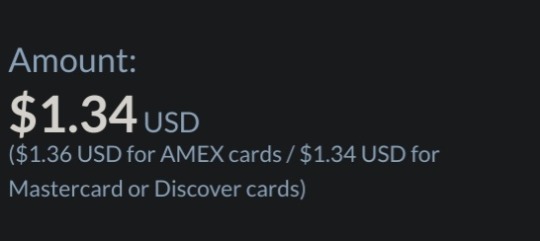
PCRF has a score of 97% on Charity Navigator.
Adults and children alike are currently dying in Palestine due to starvation. (World Health Organization Link)
The Gaza Strip is one of two places in the entire world that is categorized as Phase 5 (the highest phase) on the Integrated Food Security Phase Classification scale.
So even if you think it isn't enough, remember that donating even as little as $1.35 helps! It's $1.35 they wouldn't have had otherwise. So donate if you can. 🇵🇸
67K notes
·
View notes


